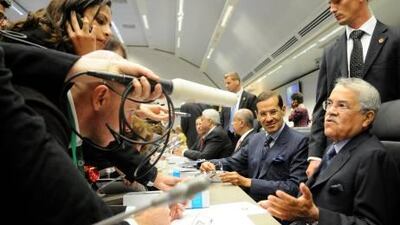RIYADH // Saudi Arabia has rejected claims that the era of cheaply produced oil is over, saying the world's largest field in the kingdom's eastern province still holds more than many countries.
Many of the largest oilfields in Texas and the North Sea have passed their prime, forcing companies to target more costly prospects such as bitumen deposits in Venezuela, Canadian tar sands and ethanol.
But Ali al Naimi, the Saudi Arabian oil minister, pointed to the Ghawar field's 88 billion barrels of remaining reserves and the kingdom's large cushion of spare pumping capacity as signs that oil was still abundant.
"I am sorry to disappoint people but the era of easy oil is not over," Mr al Naimi said at a conference held in the Saudi capital to celebrate the 50th birthday of OPEC.
"How can you say the era of easy oil is over when we still have 88 billion barrels in the Ghawar field? That is more than many countries in the world. You can dismiss the notion that easy oil in Saudi Arabia is gone."
The Ghawar field, measuring 280km by 30km, is by far the largest conventional oilfield in the world. Although details of the field's performance are not made public, it is believed to have produced more than 65 billion barrels already since production began in 1951.
Mr al Naimi's estimate of its remaining reserves was greater than many analysts had thought, possibly indicating the state oil company, Saudi Aramco, has been able to increase its expected recovery of oil. Oil companies generally expect to extract about half of the oil from a typical field, but Mr al Naimi said this recovery factor was now rising to 70 per cent in some cases. Matthew Simmons, a financier who made a name for himself by stoking fears that oil was running out, raised the prospect of a drastic decline in production at Ghawar in the book Twilight in the Desert published in 2005.
Mr Simmons also shed doubt on the size of Saudi Arabia's proved reserves, which are estimated at 260 billion barrels, according to the website of the state oil company Saudi Aramco.
Mr al Naimi rejected suggestions that Saudi Arabia's decision to develop the Manifa field, an offshore field containing heavy oil, was a sign that "easy oil" was drying up.
"We are diversifying our producing fields," he said. "We are trying to get experience with heavy oils like with Manifa, but that is the reason - it is not because easy oil is over."
Riyadh has a policy of keeping spare capacity of 2 million barrels a day but currently maintains a much larger cushion of 4 million because output has fallen to about 8 million, Mr al Naimi added.
Saudi Arabia, like the UAE, has so many large oilfields that it limits the rate of extraction to ensure they last as long as possible.
"Because we have so many fields, and big fields, we manage the depletion," Mr al Naimi said. "We have the production capacity and we don't have to deplete our reservoir as fast as someone who is just there for investment.
"We have to manage our reservoirs to last for as long as they can and at the same time meet our requirements for production capacity so we don't have to pull our reservoirs as hard as we should."
Mr al Naimi said Saudi Arabia was exploring alternative energy sources such as solar, wind, nuclear and even biofuels to meet surging domestic power needs, which are eating up an increasing amount of its crude oil.

